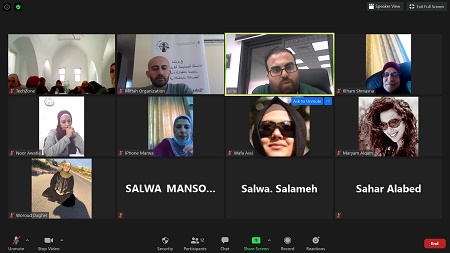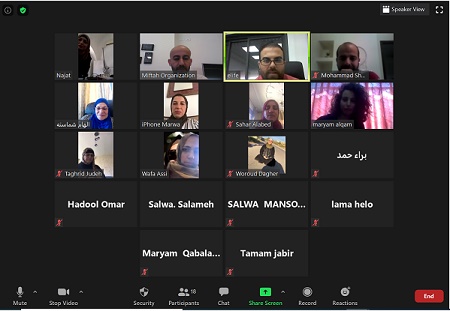|
MIFTAH caps off a series of training workshops on 'Supporting women’s participation in national elections'
Ramallah – 22/7/2020 – MIFTAH recently completed a series of training workshops on “Supporting women’s participation in national elections”, which targeted several women activists in the West Bank and Gaza Strip who represent the various factions. The training revolved around the electoral system in Palestine, the importance of elections, means of submitting candidacy applications to the Central Elections Commission (CEC), the role and nature of the CEC, mechanisms for the lists and constituency system and the difference between them and the electoral systems including proportional and mixed representation. The workshops also included ways of strengthening skills for communicating with the public and the media, creating electoral platforms, the use of the media for networking with journalists and recruiting financial support for election campaigns. The workshops included various activities geared towards promoting the concept of political participation and women’s involvement in politics, culminating in a number of recommendations including: the need to continue cooperation with activists and provide supportive platforms for them in their political and social activities in order to revitalize the democratic process. One participant, May Rahhal said that, “This training is an important part of women’s success in waging one of the most rewarding yet most difficult social experiments. It provided capacity-building for Palestinian women through boosting their abilities with even more skills in light of our current circumstances created by the coronavirus pandemic. By holding this workshop, MIFTAH invested in and developed women’s capabilities, allowing them to have a clearer understanding of the elections, therefore increasing their information and knowledge on the subject and their chances for success. The discussions allowed for an induction into the nature of women’s participation in the coming stages.”
 She added, “The unique techniques used in the training workshop elevated it by offering more details about elections and campaigns, which are the entryway to success. This starts with designing a realistic and flexible campaign that responds to the needs and rights of society in reaching a higher level of social participation. The women engaged in constructive and detailed discussions and proposals, which resulted in the increased likelihood that they will participate in upcoming elections.” Activist Raeda Sawalha maintained that the “importance of the training was what it offers for the future in terms of relaying the experiences of the old generation to the younger one. She said this allows for pluralism for a competent and sizeable pool of activists that can lay the organizational ground for a better reality for women.” Sawalha continued that “these training sessions gave us food for thought,” which therefore requires their continuation and sustainability in the future for the sake of empowering, increasing awareness and elevating the role of women in securing their rights within their parties.”
 Abdel Nasser Abu Laban, head of the CEC office in the Bethlehem district commented on what could motivate activists to participate in elections. “After participating in several workshops on reviving the political role of women, I think women’s civil society institutions or those that support women’s work should implement the following activities: reactivating the role of the General Union of Palestinian Women so that women will be able to unify their actions within an agreed agenda; working towards understanding Palestinian women’s needs, far removed from the ready-made molds imposed on women by donor parties; focusing on and disseminating the success stories of women who reached prestigious political and social positions; working with men who support women’s rights and involving men in workshops that shed light on women’s needs and rights; creating a real partnership with the CEC to work on long-term programs to achieve women’s political rights.” On her part, Rania Abu Mughseeb, who participated in the workshop in the Gaza Strip, said the experience was very enriching and was a turning point in her way of thinking. “The workshop provided me with ideas and experiences on the ground in terms of my candidacy. I hope I can achieve my goal of running and also winning in any upcoming elections and I hope MIFTAH holds more of these workshops, which we need to further enrich our experiences and strengthen our skills,” she said. Dr. Samia Ghusein, professor of international law, who was also a Gaza Strip participant, acknowledged the importance of the skills and information offered in the workshop but pointed to the lack of specialized media elections .”We are lacking in media focused on elections in spite of its significance. I hope MIFTAH focuses on and empowers women journalists by providing trainings for this type of media. It would also be helpful to expand the scope of this kind of media by providing ongoing capacity-building programs and not just a few workshops.” MIFTAH project coordinator Hassan Mahareeq said the objective of the training was to contribute to the capacity-building and empowerment of women activists within Palestinian factions and parties and to prepare them for running in the upcoming legislative elections. He said the training workshops aimed at providing the women with information about national election laws and the electoral system in Palestine; offering them skills on preparing electoral platforms and speech-making; being able to participate in political debates based on the political and social programs of their parties or factions; managing campaigns and election publicity and skills on how to reach their target groups through the use of the media. Mahareeq added that “this training workshop is part of MIFTAH’s efforts to prepare women and young leaders ready to enter public and political life and to guarantee their just representation in decision-making bodies by supporting the candidacy of youth and women in local and national elections.”
http://www.miftah.org |